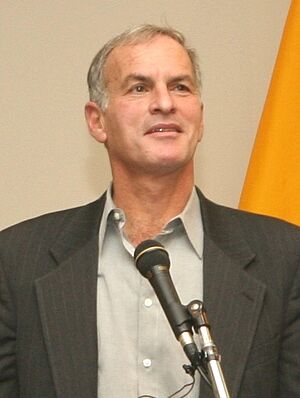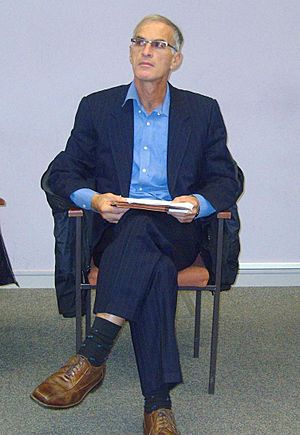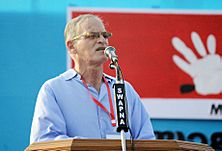Norman Finkelstein facts for kids
Quick facts for kids
Norman Finkelstein
|
|
|---|---|

Finkelstein in 2005
|
|
| Born |
Norman Gary Finkelstein
December 8, 1953 New York City, U.S.
|
| Education |
|
| Occupation | Professor, author |
|
Notable work
|
The Holocaust Industry (2000) |
Norman Gary Finkelstein (/ˈfɪŋkəlstiːn/ fing-KƏL-steen; born December 8, 1953) is an American political scientist and activist. His primary fields of research are the politics of the Holocaust and the Israeli–Palestinian conflict.
Finkelstein rose to prominence in 2000 after publishing The Holocaust Industry, a book in which he writes that the memory of the Holocaust is exploited as an ideological weapon to provide Israel a degree of immunity from criticism. He is a critic of Israeli policy and its governing class. The Israeli government barred him from entry to the country for ten years in 2008. Finkelstein's most recent book on Palestine and Israel, published in 2018, is Gaza: An Inquest into Its Martyrdom.
Contents
Early life and education
Norman Finkelstein was born on December 8, 1953, in New York City, the son of Harry and Maryla (née Husyt) Finkelstein. Finkelstein's parents were Jewish Holocaust survivors. His mother grew up in Warsaw and survived the Warsaw Ghetto and the Majdanek concentration camp. His father was a survivor of both the Warsaw Ghetto and Auschwitz. After the war they met in a displaced persons camp in Linz, Austria, and then emigrated to the United States, where his father became a factory worker and his mother a homemaker and later a bookkeeper. Finkelstein's mother was an ardent pacifist. Both his parents died in 1995.
Finkelstein has said of his parents that "they saw the world through the prism of the Nazi Holocaust. They were eternally indebted to the Soviet Union (to whom they attributed the defeat of the Nazis), and so anyone who was anti-Soviet they were extremely harsh on". They supported the Soviet Union's approval of the creation of the State of Israel, as enunciated by Andrei Andreyevich Gromyko, who said that Jews had earned the right to a state, but thought that Israel had sold its soul to the West and "refused to have any truck with it".
Finkelstein grew up in Borough Park, then Mill Basin, both in Brooklyn, New York, where he attended James Madison High School.
Finkelstein completed his undergraduate studies at Binghamton University in New York in 1974, after which he studied at the École Pratique des Hautes Études in 1979 in Paris. He was an ardent Maoist from his teenage years on and was "totally devastated" by the news of the trial of the Gang of Four in 1976, which led him to decide he had been misled. He was, he says, bedridden for three weeks.
He received his Master's degree in political science in 1980, and his PhD in political studies from Princeton in 1988. He is a member of Phi Beta Kappa. His doctoral thesis was on Zionism. Before gaining academic employment, Finkelstein was a part-time social worker with teenage dropouts in New York.
According to Finkelstein, his involvement in the Israeli–Palestinian conflict began in 1982 when he and a handful of other Jews in New York protested against the Israeli invasion of Lebanon. He held a sign saying: "This son of survivors of the Warsaw Ghetto Uprising, Auschwitz, Maijdenek will not be silent: Israeli Nazis – Stop the Holocaust in Lebanon!"
During the First Intifada, he spent every summer from 1988 in the West Bank as a guest of Palestinian families in Hebron and Beit Sahour, where he taught English at a local school. Finkelstein wrote that the fact that he was Jewish didn't bother most Palestinians: "The typical response was indifference. Word had been passed to the shebab that I was 'okay' and, generally, the matter rested there." He recounted his experiences of the intifada in his 1996 book The Rise and Fall of Palestine.
Academic career

Finkelstein first taught at Rutgers University as an adjunct lecturer in international relations (1977–78), then at Brooklyn College (1988–1991), Hunter College (1992–2001), New York University (1992–2001), and DePaul University (2001–2007). The New York Times reported that Finkelstein left Hunter College in 2001 "after his teaching load and salary were reduced" by the college administration. He has said he enjoyed teaching at Hunter and was "unceremoniously kicked out" after begging the college to keep him on with just two courses a semester for $12,000 a year. Hunter set conditions that would have required him to spend four days a week teaching, which he thought unacceptable. Finkelstein taught at Sakarya University Middle East Institute in Turkey in 2014–15.
Writings
Finkelstein has described himself as a "forensic" scholar who has worked to demystify what he considers pseudo-scholarly arguments. He has written scathing academic reviews of several prominent writers and scholars who he says misrepresent facts in order to defend Israel's policies and practices. His writings have dealt with politically charged topics such as Zionism, the demographic history of Palestine, and his allegations of the existence of a "Holocaust industry" that exploits the memory of the Holocaust to further Israeli political interests. He has also described himself as "an old-fashioned communist", in the sense that he "see[s] no value whatsoever in states."
Finkelstein's work has been praised by scholars such as Noam Chomsky, the political scientist Raul Hilberg, and historian Avi Shlaim, and his advocates and detractors have remarked on his polemical style.
Views on the Israeli–Palestinian conflict
Comments about Israel
Finkelstein is a sharp critic of the state of Israel, which he has called the "Jewish supremacist state" and believes is committing the crime of apartheid against Palestinians.
Hezbollah and Hamas
Finkelstein has expressed solidarity with Hezbollah with respect to defensive actions.
One-state solution, two-state solution, and the Palestinian refugees
Finkelstein has said he believes that the Palestine solidarity movement should focus on a pragmatic settlement of the Israeli–Palestinian conflict rather than a just one. In his view, the two-state solution is the pragmatic option and the one-state solution the idealistic one. He claims that the two-state solution is deeply unjust to the Palestinians.
According to Finkelstein, the two-state solution is achievable, and the one-state solution is not. His view of the one-state solution is "a society in which Jews and Palestinians enjoy the same democratic rights. One Jew, one vote, one Palestinian, one vote." This, he argues, is a society Israeli Jews will never acquiesce to because Jewish dominance cannot be guaranteed.
Finkelstein argues that even if a binational state comes into existence, there is no guarantee of an absence of bloodshed. He sees the Yugoslav Wars, Lebanon, and Czechoslovakia as showing why Jews and Palestinians sharing a state could be problematic.
For these reasons, Finkelstein prefers the two-state solution. He believes that, while such a solution is currently politically impossible, it could come to fruition through mutually agreed land swaps and by evacuating about half of all Israeli West Bank settlers.
The BDS movement
Finkelstein is critical of the Boycott, Divestment and Sanctions (BDS) movement. BDS demands three things of Israel: an end to the occupation and the removal of the separation barrier in the West Bank, full equality for Arab-Palestinian citizens of Israel; and "respecting, protecting, and promoting the rights of Palestinian refugees to return to their homes and properties". It advocates international boycotts, divestment and sanctions against Israel to achieve these goals. Finkelstein believes that BDS's tactics are correct but not its demands. BDS has no official position on the one- or the two-state solution, which he finds dishonest, because in his view, BDS's demands would eliminate Israel: "If we end the occupation and bring back six million Palestinians and we have equal rights for Arabs and Jews, there’s no Israel."
Works
- 2022: I'll Burn That Bridge When I Get To It, Sublation Media, Portland, ISBN: 979-8-9867884-2-5
- 2019: I Accuse!: Herewith A Proof Beyond Reasonable Doubt That ICC Chief Prosecutor Fatou Bensouda Whitewashed Israel, OR Books, New York (2019), ISBN: 9781682192276
- 2018: Gaza: An Inquest Into Its Martyrdom, University of California Press, Oakland, California, January 2018, ISBN: 9780520295711
- 2014: Method and Madness: The Hidden Story of Israel's Assaults on Gaza, OR Books, New York (2014), ISBN: 978-1-939293-71-8
- 2014: Old Wine, Broken Bottle: Ari Shavit's Promised Land, OR Books, New York (2014), ISBN: 978-1-939293-46-6
- 2012: Knowing Too Much: Why the American Jewish Romance with Israel is Coming to an End, OR Books, New York (2012) ISBN: 978-1-935928-77-5
- 2012: What Gandhi Says About Nonviolence, Resistance and Courage, OR Books, New York: 2012, ISBN: 978-1-935928-79-9
- 2011: Goldstone Recants. Richard Goldstone renews Israel's license to kill, OR Books, New York (2011), ISBN: 978-1-935928-51-5
- 2010: This Time We Went Too Far: Truth and Consequences of the Gaza Invasion. OR Books, New York: 2010. ISBN: 978-1-935928-43-0
- 2007: Dennis Ross and the Peace Process: Subordinating Palestinian Rights to Israeli "needs", Institute for Palestine Studies, Washington, D.C. ISBN: 978-0-88728-308-6
- 2005: Beyond Chutzpah: On the Misuse of Anti-Semitism and the Abuse of History. University of California Press: Berkeley, 2005. ISBN: 978-0-520-24989-9
- 2000: The Holocaust Industry: Reflections on the Exploitation of Jewish Suffering, Verso; ISBN: 1-85984-488-X.
- 1998: A Nation on Trial: The Goldhagen Thesis and Historical Truth (co-written with Ruth Bettina Birn), Henry Holt and Co.; ISBN: 0-8050-5872-9.
- 1996: The Rise and Fall of Palestine: A Personal Account of the Intifada Years. Minneapolis: U of Minnesota P, ISBN: 0-8166-2859-9.
- 1995: Image and Reality of the Israel-Palestine Conflict, Verso; ISBN: 1-85984-442-1
- 1987: From the Jewish Question to the Jewish State: An Essay on the Theory of Zionism (thesis), Princeton University.
See also
 In Spanish: Norman Finkelstein para niños
In Spanish: Norman Finkelstein para niños
- American Radical: The Trials of Norman Finkelstein 2009 documentary


